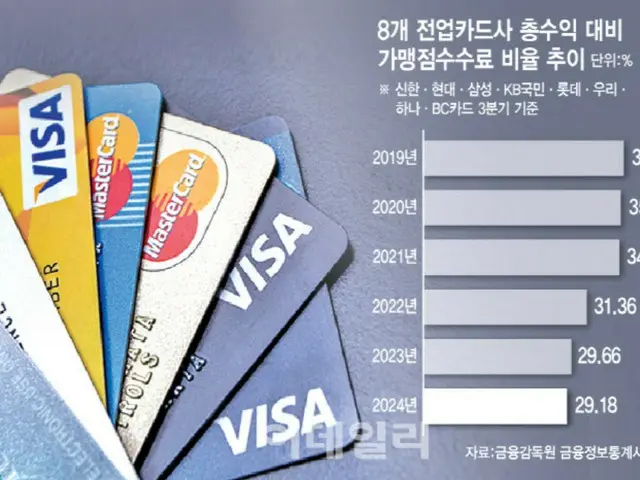With the introduction of this new system, fees for simple payments such as Samsung Pay are expected to increase without limit.
According to the financial industry, from the 14th of this month, small and medium-sized franchisees with annual sales of less than 3 billion won (approximately 313 million yen)
The card fees for credit card member stores will be reduced according to the size of sales, with member stores with annual sales of 300 million won (approximately 31.3 million yen) or less being reduced from 0.5% to 0.4%.
The reduction will be 0.05% from 0.1%. Debit card fees will also be reduced by 0.1% from the current level. This reduction in merchant fees will benefit micro, small and medium-sized businesses with annual sales of less than 3 billion won.
The 3,046,000 member stores will be able to reduce their commission burden by an average of 8.7%. Small member stores with annual sales of less than 300 million won will be able to save 200,000 won (about 20,900 yen) in commission fees per year.
In contrast to merchants who will see their fees reduced, card companies are crying out in frustration. Since 2007, merchant fees have been reduced for the 15th consecutive year over the 18 years since.
However, credit sales, which is the main business of card companies, have been in the red, and the deficit cannot be avoided from widening.
The card industry is predicting this. Until last year, card companies had been performing well. The reduction in base interest rates had reduced the burden of fund raising costs.
In addition, the increase in card usage has also been a driving force behind the improvement in business performance. According to the Credit Finance Association, the approved card amount last year was 1
The figure was 209 trillion won (US$1.26 trillion), up 4.1% from the previous year. In particular, the increase in card loans due to the recession also contributed to the increase in profits.
The cumulative card loan revenues of the eight card companies in the first half of the year was 3.6765 trillion won (US$3.7 billion), up 12.2% from the previous year.
The problem is that the business outlook for card companies this year is bleak. Card companies are promoting the introduction of Apple Pay in an effort to find new ways to make money.
This is because they may have to pay high fees to payment companies. Shinhan Card and KB Kookmin Card will start linking their services with Apple Pay as early as this month.
It has been about two years since Hyundai Card introduced Apple Pay. The move is aimed at attracting customers in their 20s and 30s and protecting existing customers.
Other card companies are also considering introducing Apple Pay. If the card industry fully adopts Apple Pay, it will also spark a debate about charging for simple payments.
In fact, Samsung Electronics has decided that if Shinhan Card and KB Kookmin Card also pay fees to Apple Pay to collaborate with the company, Samsung Pay will also impose fees.
If Samsung Electronics received the same commission as Apple, the card companies would have to pay about 130 billion won (about 120 million yen) in commission per year.
If other easy payment companies such as Pay and KakaoPay also start charging, the burden on card companies is expected to snowball.
A source in the card industry said, "The commission income received from affiliated stores has decreased significantly, and the introduction of Apple Pay has
"In order to make up for the deficit in credit sales, we will have to implement measures to reduce consumer spending, such as terminating services for general cards and raising annual fees," he said.
"We have no choice but to pass the burden on to others," he said.
2025/02/11 07:12 KST
Copyrights(C) Edaily wowkorea.jp 107

